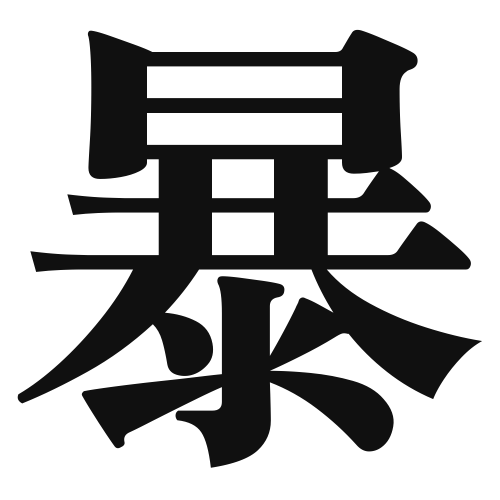1. Overview of Meaning
The kanji “暴” (bō) generally means “violence,” “outrage,” or “to act violently.” It conveys a sense of forcefulness or aggression in actions or behavior.
2. Formation and Radical
Formation of the Kanji: The kanji “暴” is a phonetic-ideographic character (形声文字). It combines the radical for “violent” (暴) with a phonetic component that suggests its pronunciation.
Radical: The radical for “暴” is “暴” itself, which relates to the concept of violence or force.
3. Examples of Usage
Common Words and Phrases: Some frequently used words that include “暴” are:
- 暴力 (bōryoku) – violence
- 暴風 (bōfū) – storm
- 暴露 (bakuro) – exposure
Example Sentences in Daily Conversation:
- 彼は暴力を振るうことはない。 (Kare wa bōryoku o furuu koto wa nai.) – He does not resort to violence.
- 暴風が近づいている。 (Bōfū ga chikadzuite iru.) – A storm is approaching.
4. Synonyms and Antonyms
Similar Kanji: A kanji with a similar meaning is “凶” (kyō), which means “evil” or “wicked.” While both convey a sense of negativity, “暴” emphasizes violent actions, whereas “凶” focuses more on malevolent intent.
Opposite Kanji: An antonym for “暴” is “平和” (heiwa), which means “peace.” This represents a state of tranquility and absence of violence.
5. Cultural and Historical Background
Relation to Japanese Culture: The concept of “暴” is often reflected in Japanese literature and media, where themes of violence and conflict are explored. It can also be seen in historical contexts, such as during periods of civil unrest.
Proverbs and Idioms: One common saying is “暴風雨の後には晴天が来る” (Bōfūu no ato ni wa seiten ga kuru), which translates to “After the storm comes the clear sky,” symbolizing hope after turmoil.
